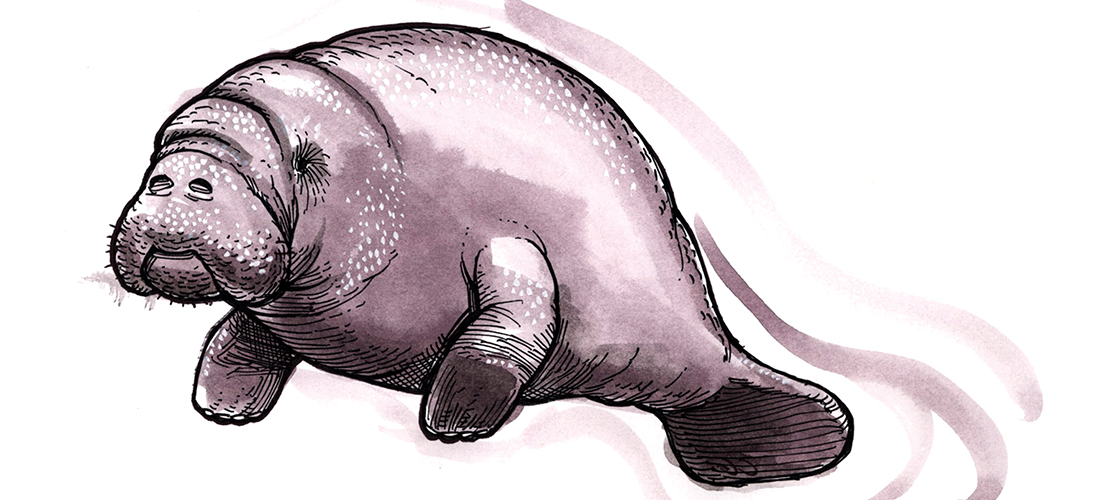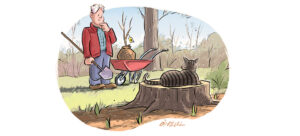
Hanging in the Balance
Notes from land, sea and air
By Maria Johnson
It was one of the all-time best Christmas presents ever: a red plastic folder from my engineer husband, Jeff.
Ah, but this wasn’t just any festive red folder lying under the tree.
The title page said: “Trip to Florida: Swimming with Manatees.”
The following pages, printed from a PowerPoint presentation he’d made (not kidding) explained how we’d get there; where we’d stay; what we’d do.
The main attraction, hanging out with manatees, was something I’d wanted to do ever since two newspaper colleagues gushed about snorkeling with sea cows 30 years ago.
But I had no clue until I started brushing up on manatees — 1,000-pound mammals that resemble a cross between a big seal and a small whale — that they’ve been very much in the news lately.
That’s because there’s a state-backed program in Florida to feed them romaine lettuce. That’s because a record number of manatees died last year. That’s because the sea grasses they eat have been choked out by algae blooms. That’s because of fertilizer runoff, sewage discharges and the like. And that’s because . . . ta-da, humans.
Merry Christmas.
Still, I was in a cheery mood as we boarded our nonstop flight to St. Petersburg. The sun was shining, the plane was on time and no one at the gate had stopped me because my suitcase was possibly — i.e. definitely — over the weight limit.
I smiled the smile of a scofflaw.
We buckled up as one of the attendants pantomimed what to do in case of an emergency. The engines revved. A couple of seats over, a white-knuckled woman squeezed her eyes shut and started her mantra: “Please Jesus, please Jesus, please Jesus.”
I decided it might be a good time to study the survival cartoons tucked into the seat-back pouch in front of me. I’d never done that. And don’t necessarily recommend it.
But just in case you’re interested, here’s the gist:
If an oxygen mask drops down in front of you, yank on it, put it on, then help the expressionless child who, according to the card, will be sitting right next to you.
If you look out the window and see you’re about to crash on land or water, put your head between your legs so the child will not be able to read your lips.
If you happen to land in one piece and leaving the plane on an inflatable slide is an option, do not jump onto the slide as if you’re having a big time inside a bouncy house. Sit down and slide gently. You won’t have to explain this to Zen-child because they’re way calmer than you are. (Who is this kid, anyway?)
And finally, don’t wear high heels as you leave the plane because if you puncture that freakin’ slide, and the people behind you can’t get off, your fashionable ass will be the last one on the life raft.
I’m just reading between the cartoon lines here.
Conclusion #1: Flying in an airplane is like riding in a bubble. A thin film of safety surrounds you.
Conclusion #2: Don’t wear heels. Ever.
I needed to get my mind on something else. I leafed through a magazine I’d brought and landed, naturally, on a story about a filmmaker and entrepreneur who has been experimenting in Arizona with an enclosed Earth-like environment — imagine a big terrarium, with people — because he’s convinced the actual Earth is going to break up with humans by saying something like:
“Listen, it’s not you; it’s me. Nah, I’m lying. It’s you.”
You might remember that someone else tried to create a sort of miniature Earth — with the idea of eventually hurling it into space — in Arizona in the late 1980s. The experiment was called Biosphere 2, and it failed, basically because the oxygen ran out and the knockoff environment was not complex enough to replace it.
The story pointed out that oxygen accounts for about one-fifth of the air we breathe, and once atmospheric oxygen drops below 19.5 percent, human cells start showing signs of distress.
Guess what the oxygen level was in the latest Arizona bubble after four hours?
Seventeen percent.
I closed the magazine. It seemed like the universe was trying to tell me something. Other than don’t wear heels.
I got the message again a couple of days later, as we wriggled into wetsuits and snorkels and slipped into the 72-degree water of Kings Bay near Crystal River, Florida, a favorite manatee wintering spot because of the warm springs that feed the river.
Our guide, Rob, a former Marine who’d gotten sick of working under fluorescent lights in a warehouse, swam to a spot and pointed down.
We dipped our masks under the water just in time to see a gentle giant glide by.
Rob waved us to another spot, closer to the edge of the cove, where a manatee and her calf noshed on sea grass. The grass grew only in a narrow band, where the sunlight could reach it.
The manatees slipped away faster than we could follow. Rob had told us not to chase them. We were to disturb them as little as possible. We were in their home, he said.
The wind whipped the palm trees on shore. Our captain, Glenn, who described manatees as “the ultimate hippies,” waved us aboard. We’d try another spot. We might get lucky, he said, because a cool front was moving in, and the manatees, ever sensitive to the Earth’s whispers, would respond by eating more.
He piloted the boat to another cove, where we descended again and peered into a world vivid with darting fish and waving crabs and swaying grasses that gave off tiny bubbles.
Several yards below, on the sandy bottom, a mama manatee and her nursing calf hovered.
We hung there in a loose circle on the surface, rocked by the waves and the rhythmic rasps of our breaths moving through the snorkel tubes. With ears submerged, we could hear the squeaky patter of mom and baby.
The torpedo-shaped calf, all 7 feet of it, detached and rose to the surface, its curvy face passing a few feet in front of mine. Smoky spirals of milk streamed from its thick hound-dog upper lips.
Its eyes were round, calm, trusting.
Its blunt snout breached the surface and took in air.
I floated there, enchanted. We were to touch the manatees only with one hand — and only if they touched us first.
Mom and calf drifted away.
A few minutes later, as we paddled toward Rob, who’d made another sighting, Jeff tapped my shoulder with urgency.
I looked over. A huge manatee was moving right beside us.
Its sandpapery skin brushed Jeff’s hand as it slipped by peacefully.
We smiled around our mouthpieces.
It was their home.
And our honor. OH
Maria Johnson is a contributing editor of O.Henry magazine. You can reach her at ohenrymaria@gmail.com.





